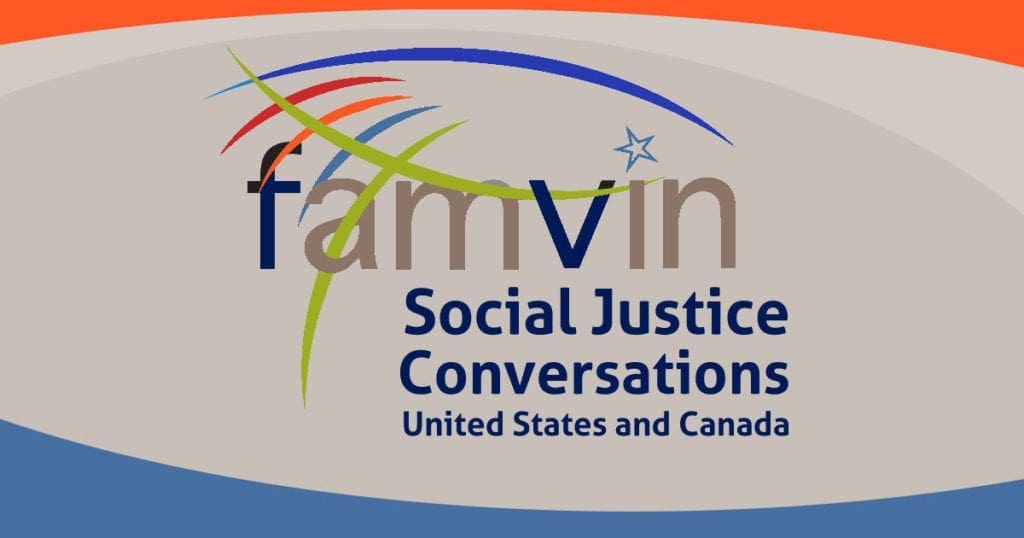Pope Francis has said that, “Human trafficking is the most extensive form of slavery in this twenty-first century!”
Human trafficking is the use of force, fraud or coercion in an effort to exploit someone for labor or commercial sex. The International Labor Organization estimates that there are 40.3 million victims of human trafficking globally, with hundreds of thousands in the United States. Some of the root causes of human trafficking are war and conflict; forced migration, climate change; poverty; and gender inequality.

Human traffickers exploit people on the move and newly arrived immigrants because of their precarious social and economic circumstances. Undocumented immigrants are at even greater risk because they live in constant fear of apprehension, detention and deportation. War and conflict in many parts of the world are causing more people to become refugees, leaving their home countries often with only short notice. Parents in Central America are sending their children unaccompanied to the U. S. hoping they will be safe from the gangs and violence in their own countries.
The International Organization of Migration says that “Climate change increases the risk of natural disasters and places a strain on livelihoods; it exacerbates poverty and can potentially cause situations of conflict and instability.” Pope Francis states in his encyclical, Laudato Si’ (25), “There has been a tragic rise in the number of migrants seeking to flee from the growing poverty caused by environmental degradation. They are not recognized by international conventions as refugees; they bear the loss of the lives they have left behind, without enjoying any legal protection whatsoever. Sadly, there is widespread indifference to such suffering, which is even now taking place throughout our world.” Floods, fires, drought, severe storms—all contribute to forcing people to migrate in search of food, shelter, and jobs. Human traffickers abound where human vulnerability exists!
There is a connection between gender inequality and human trafficking. Globally, women and girls account for 71 percent of all trafficked persons while men and boys represent about 29% of trafficking victims. Women and girls are exposed to specific forms of exploitation such as sexual exploitation and violence; domestic servitude and forced marriage. Men and boys are victims of forced labor (63%) and organ removal (82%). One of the United Nations’ Sustainable Goals is to achieve gender equality and empower all women and girls. It emphasizes that gender equality is not only a fundamental right but also a necessary foundation for a peaceful, prosperous and sustainable world.
The Board of Directors of the Ladies of Charity USA in 2010 “established a priority for advocacy education and action on violence against women in an attempt to alleviate the dire consequences of gender violence for women, children, families and communities.” The Ladies of Charity joined their voice to our Vincentian and Church collaborators to “address human trafficking and its many forms of enslavement.” (LCUSA Human Trafficking Resolution, 4/14/2011).
Human trafficking is driven by an interconnected web of social injustice and human apathy. Pope Francis says in Fratelli Tutti that “Trafficking in persons and other contemporary forms of enslavement are a worldwide problem that needs to be taken seriously by humanity as a whole…”
An organization which is taking human trafficking seriously is the U. S. Catholic Sisters Against Human Trafficking (www.sistersagainsttrafficking.org). They are guided by the principles of Catholic Social Teaching as they work to end human trafficking by raising awareness; supporting survivors on their journey to healing; and advocating for public policies that will eradicate this affront to human dignity.
In the United States, there are two pieces of legislation which must be reauthorized by Congress and which are crucial in the ongoing work to end human trafficking and support survivors: Trafficking Victims Protection Act and the Violence Against Women Act. Also, The Domestic Workers Bill of Rights Act (HR 3760) (S. 2112) needs our support. Domestic workers represent the highest percentage of labor trafficking situations reported to the U. S. National Human Trafficking hotline.* We are urged to contact our Congressional representatives and demand equal rights for all workers.
February 8, the feast day of Josephine Bakhita, the patron saint of victims of modern slavery and human trafficking, is also known as the World Day of Prayer, Reflection and Action Against Human Trafficking. Cardinal Michael Czerny, SJ, Under-Secretary of the Vatican Office for Migrants and Refugees said: “As long as we keep our eyes closed and our ears closed, and continue to pretend that human trafficking is something that barbarians do on the other side of the world, it’s going to continue, and it’s going to get worse. Human trafficking is going on in our neighborhoods; it’s going on in your own neighborhood.” Ending slavery is everyone’s work!
Marie A. Copeland
Northeast Region Advocacy Liaison Ladies of Charity, USA aic.ladiesofcharity.us
*(National Human Trafficking Hotline: 1-888-373-7888 or *Text ”BeFree” 233733; International Tip Line 1-802-872-6199).
polarisproject.org – Take Action on Human Trafficking Issues







0 Comments